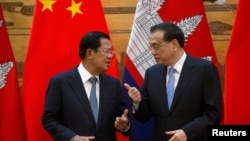Prime Minister Hun Sen is visiting China to strengthen ties with Beijing amid deteriorating relations with Europe and the United States.
In a post on his official Facebook page, Hun Sen said Cambodia was looking to “expand and reinforce its market besides the US”, saying trade between China and Cambodia had reached $5.6 billion.
“Our friend, China, is the biggest investor in Cambodia, particularly in infrastructure, roads, bridges, flyovers and dams,” he wrote.
On the second day of his visit Hun Sen met company representatives in Beijing.
Chheang Vannarith, president of Asian Vision Institute, said the growing closeness with China was strategically beneficial for Cambodia while the West continued to pressure Hun Sen over rights abuses and the banning of the country’s main opposition party.
“Frankly speaking, it's a new turning point for geopolitics in Asia. While in Asia, we can see that China is trying to gain power economically and perhaps through security, politics and culture next in Asia,” he said. “So strengthening ties with China is beneficial to Cambodia and such is also the case for other nations in Asia. So the pressure from the West is a compelling factor for Cambodia to strengthen strategic ties with China in a call to the West that Cambodia isn't an isolated nation.”
Hun Sen’s ruling Cambodian People’s Party won a landslide victory in elections in July after it oversaw the dissolution of the opposition Cambodia National Rescue Party in November 2017 and the jailing of its leader, Kem Sokha, two months earlier.
Last week, the European Union imposed tariffs on Cambodian rice imports due to safety concerns.
Vannarith said ties between Cambodia and China were likely to only get stronger.
“We can see that China is the biggest source of investors. But we see that bilateral trade with China is still limited. China is yet to become Cambodia's biggest export market. So there are many things lacking here. Most Cambodians do not like Chinese. As we can see in [Preah] Sihanouk province, there the Chinese do not obey the law and do not respect the culture. That affects the local people.”
Meas Ny, a political analyst in Cambodia, said Chinese funds were attractive to Hun Sen because they came with fewer strings attached than Western aid, which was usually linked to political compromises on human rights or governance.
“This is just an attempt to move away from aid from the West and turn to aid from China; the Cambodian government regards money with no conditions from China as easy-to-spend money.”
“When Cambodia began close relations with China, we can see gradual Chinese investment, particularly with economic land concessions. This leads to a drop in the government's popularity because most of the concessions did not undergo thorough studies which in turn affect the locals.”
“And after the drop in popularity, the government is trying to do whatever it can to maintain power and safety in any circumstance.”









